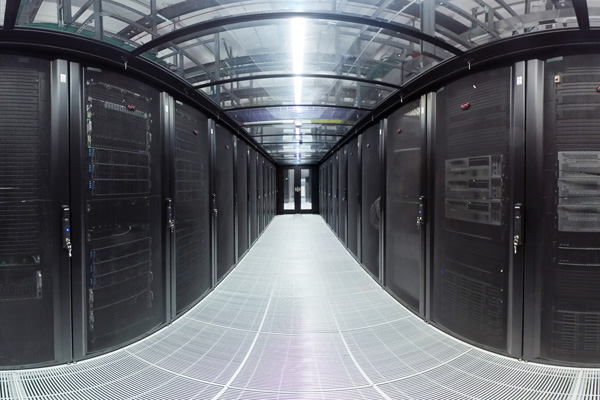
National Computing Center CNAF - INFN. ©INFN, Roberto Giacomelli
|
|
|
High performance, minor impact:
the future of computing
|
|
|
In recent years, awareness of the importance of sustainability as a fundamental goal for our future has increasingly spread among the general public, scientific communities, and institutions. The urgency of mitigating climate change has led scientific communities to approach sustainability not only as a phenomenon to study but also as a crucial issue to incorporate into all major future scientific projects. From the development of energy-efficient technologies to the eco-design of new large-scale research infrastructures, and the creation of tools for understanding and managing global environmental challenges, the physics community is engaging with the issue both directly and indirectly. The topic of computing for sustainability and, from a reversed perspective, the sustainability of computing, is becoming ever more relevant. Indeed, while the models produced through supercomputing and artificial intelligence allow us to tackle complex phenomena such as epidemics or the impacts of climate change, computing centers employ increasingly powerful machines to generate them. These computers, which consume vast amounts of energy, have a significant footprint, and their energy demand is expected to continue rising in the coming years. Therefore, while they represent a resource for sustainability, they also pose an environmental sustainability challenge themselves. We talk in depth about supercomputing, future prospects, and the management of growing energy demands in data centers in our interview with Marco Aldinucci, coordinator of the High-Performance Centre for Artificial Intelligence (HPC4AI) at the University of Turin and co-leader of Spoke 1 of the National Center for Research in High Performance Computing, Big Data, and Quantum Computing (ICSC).
|
|
|
Marco Aldinucci is professor of Computer Science and coordinator of the Parallel Computing research group at the University of Turin. He founded the HPC4AI@UNITO laboratory and the national HPC laboratory of the CINI consortium of which he is director. He is co-leader of Spoke 1 of the National Center for Research in High Performance Computing, Big Data and Quantum Computing (ICSC), dedicated to developing highly innovative hardware and software technologies for future supercomputers and computing systems
|
|
Interview with Marco Aldinucci, coordinator of the High-Performance Center for Artificial Intelligence (HPC4AI) at the University of Turin and co-leader of Spoke 1 of ICSC, dedicated to High Performance Computing (HPC) and Big Data.
What are we talking about when we refer to HPC?
High Performance Computing means using extremely high computing power to solve a problem faster or to solve a bigger problem than the initial one in the same amount of time. In the first case, HPC comes into play for solving scientific or industrial problems where the value of the information degrades over time. Examples include weather forecasting or simulations of natural phenomena that trigger operational scenarios, pharmaceutical chemistry, and materials science, where the computational complexity is enormous and the analysis needs to be completed in a reasonable time.
|
|
|
|
|
|
|
|
INTERNATIONAL COLLABORATIONS
|
|
|
Giovanni Poleni Museum, Padua
|
|
|
|
|
|
Italy Pavilion, EXPO 2025 Osaka - 3:30 PM (JST)
|
|
|
|
If you can't see the message below correctly, go here
If you receive this newsletter without subscribing, it means that you have been added to a list of recipients who may be interested, or you are an employee or affiliate of INFN.
If you no longer wish to receive this newsletter and are not an employee or affiliate of INFN, you can unsubscribe by sending an email to grafica@lists.infn.it.
Particle Chronicle © 2025 INFN
Newsletter Archive
EDITORIAL BOARD
Coordinator Martina Galli;
Project and contents Martina Bologna, Cecilia Collà Ruvolo, Eleonora Cossi,
Francesca Mazzotta, Antonella Varaschin;
Design and mailing coordinator Francesca Cuicchio; ICT service SSNN INFN
INFN - COMMUNICATIONS OFFICE - Piazza dei Caprettari, 70 - 00186 Roma
www.infn.it - news@lists.infn.it
|
|
|
|